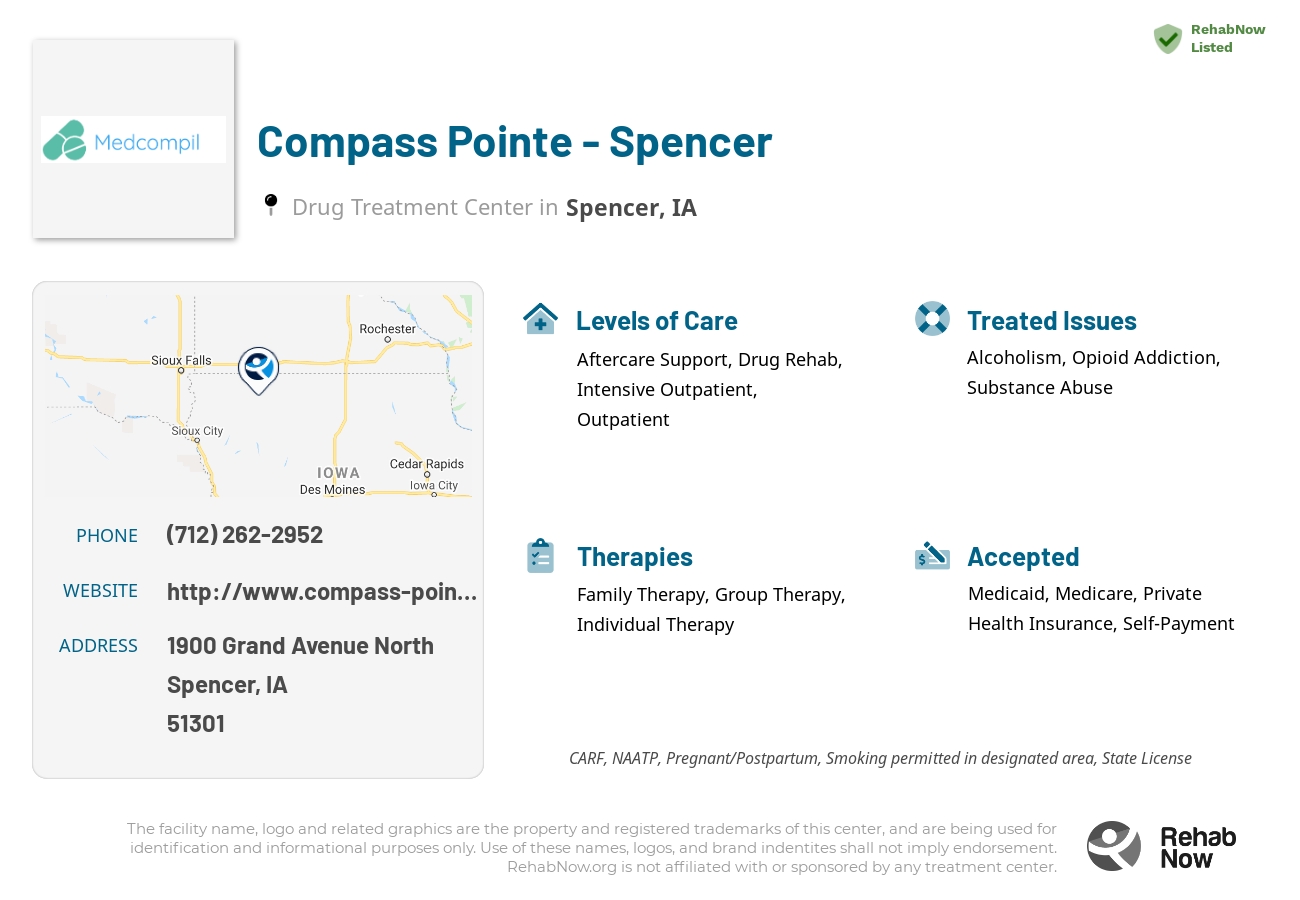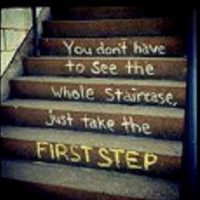Compass Pointe - Spencer
Drug Rehab Center in Spencer, Iowa
Compass Pointe - Spencer is a dual-diagnosis addiction and substance abuse rehabilitation facility that offers tailored services including therapy, medication-assisted treatment, and family therapy to promote lasting lifestyle changes in patients.
Multiple patients have reported Compass Pointe - Spencer as permanently closed.
Research other rehabs in Spencer, Iowa, or get help finding an open facility.
About Compass Pointe - Spencer in Iowa
Compass Pointe - Spencer is an addiction and substance abuse rehabilitation facility located in Spencer, Iowa. It is a dual-diagnosis treatment facility that is designed to help promote lasting lifestyle changes in people struggling with addiction issues. The facility provides a range of services including a 12-Step based curriculum, individual and group therapy, medication-assisted treatment, and family therapy. All of their services are tailored to the individual needs of each patient and the goal of recovery is paramount in the care at Compass Pointe - Spencer.
At Compass Pointe - Spencer, they provide a comprehensive range of services for addiction recovery. This includes access to a compassionate and experienced team of addiction specialists who work with patients to reduce the physical, emotional and psychological effects of addiction. Through individual and group therapy, patients learn about the disease of addiction, and how to effectively manage their recovery. The facility also provides medically-assisted treatment to help mitigate withdrawal symptoms and reduce cravings, and medication monitoring to ensure safe usage. Family therapy is encouraged in order to help build a strong foundation of recovery and long term support.
Compass Pointe - Spencer is accredited by the Commission on Accreditation of Rehabilitation Facilities (CARF). Their commitment to providing the highest standard of care to their patients is evident in the awards they have received, such as the "Excellence in Care" award, and their dedication to providing comprehensive and customized treatment plans to every patient. As part of their commitment to complete recovery, they also offer continuing care services such as alumni programs, aftercare services and relapse prevention. All of these services are designed to give patients the best opportunity to create long-term sobriety.
Genders
Ages
Modality
Additional
Conditions and Issues Treated
Substance abuse is a severe problem that affects many people in Spencer, IA. It is characterized by the excessive and inappropriate use of drugs, including alcohol, medications, and illicit drugs. Substance abuse can lead to physical or psychological dependence and affect social life and relationships. Treatment options include medications, counseling sessions, behavioral therapy, and group therapy. If you are suffering from substance abuse, contact for the latest treatments available.
Opioid addiction is when someone becomes addicted to opioids. This can happen quickly due to any opioid use. Opioid withdrawal can be uncomfortable and lead the user to continue using even if they want to quit. It’s best to receive inpatient treatment for detoxification.
Even if a person doesn’t need inpatient treatment, it’s recommended to start rehabilitation or at least some kind of outpatient treatment. This is because the withdrawal symptoms from opioids can be uncomfortable and unpleasant, to the point that a person could end up using again or worse.
Detoxification should be done to break the physical addiction of opioids. This can be done with opioid replacement therapy, medication-assisted therapy, or a more traditional detoxification program. Intensive outpatient treatment is a form of addiction care that allows patients to continue living at home while undergoing treatment. This type of care is appropriate for patients who have been treated in residential treatment programs. Intensive outpatient programs include regular visits to the facility providing therapy, and patients gradually return to their routine life. IOP benefits most when patients have a supportive family member or friend to help them recover.
The first step to getting into an intensive outpatient program is to attend a detoxification facility. Detoxification facilities are designed to remove substances from the body safely. The patient will attend sessions designed to help them understand their addiction and its impact on their lives. While in an intensive outpatient program, therapy sessions are scheduled three to five times per week, with the patient attending no more than two sessions in one day.
Levels of Care Offered
This center offers a variety of custom treatment tailored to individual recovery. Currently available are Aftercare Support, Drug Rehab, Intensive Outpatient, Outpatient, with additional therapies available as listed below.
An intensive outpatient treatment program, or IOP, is set up for those struggling with an addiction to begin the recovery process. However, the patient will not live at the facility during treatment.
IOP involves patients coming in and out of a medical office building regularly to receive therapy and other services while continuing their life outside of these visits.
IOP is a step up from drug detoxification or alcohol detox. However, it’s still considered a phase of recovery rather than the ultimate goal. There are many rehabs and treatment facilities available to patients in need of IOP.
Outpatient treatment consists of counseling and therapy sessions. The outpatient treatment process begins with the addict’s initial detox period, lasting about ten days. Outpatient treatment is used for those who are at moderate risk for “slipping back” into the addiction. It is also used for those who are not currently experiencing any side effects from withdrawal, can handle social pressure, have a stable living environment, and have a good support system.
Aftercare support is often overlooked in the treatment of drug and alcohol addiction. However, it’s an essential part and should be considered when planning a course of rehab.
Aftercare is a term that’s used to refer to any sort of continuing care offered for a drug addict who has voluntarily entered a rehabilitation program. This type of care can be provided in several settings, including outpatient therapy sessions after the addict has completed an inpatient program. There are also 12-step support groups, such as Alcoholics Anonymous, which can provide additional help for addicts trying to stay sober.
Aftercare is vital because addicts often face many challenges as they attempt to recover from drug addiction or alcoholism. Because of the powerful nature of these addictions, those who struggle with a drug or alcohol problem will likely have to face the craving for their substance of choice for the rest of their lives. Recovering can be a lonely and frustrating endeavor, especially without the support of others who are going through similar situations.
Therapies & Programs
Individual Therapy is a crucial component of addiction recovery. Therapists work with patients to identify the root of their addiction and figure out how to better handle the issues that led to them using drugs. Individual Therapy is one on one sessions where people meet with their therapist. Individual therapy provides a safe space for people to open up and discuss personal and sensitive topics which they may not feel comfortable discussing in a group setting.
In this type of therapy, therapists can develop specific solutions for each patient, which helps speed up their recovery process. In addiction recovery, therapy is a crucial part. It allows patients to go deep into their core issues and discover how those problems can be better handled now. Therapy can be performed in individual sessions as well as group settings. In individual therapy for addiction, the patient meets with the therapist one-on-one to focus on the underlying issues of addiction and come up with solutions to prevent future abuse.
Family therapy is a crucial part of drug treatment and getting sober. It is one of the most effective ways to help addicts stay on the path to long-term sobriety. One of the most important parts of family therapy is the relapse prevention plan. During treatment, therapists and doctors will often sit down with the addict and their family to develop a plan if the addict ever feels like they want to use again. This plan should involve steps the addict and family can take together to prevent them from relapsing in the future.
An addict’s family can play a vital part in helping them to avoid relapse because they can spot the warning signs and help them get back on track before it becomes too much of a problem. Family therapy is one of the most effective ways to help addicts stay on the path to long-term sobriety.
Group Therapy is employed by drug treatment centers like Compass Pointe - Spencer to provide the recovering addict with a platform to talk about their feelings and experiences. It also provides for an opportunity to learn from other addicts who have successfully overcome their addiction. It is recommended that all group members be recovering addicts for this type of therapy to work.
Cognitive Behavioral Therapy (CBT) is an approach and method in psychotherapy. Compass Pointe - Spencer asks people to investigate how their thoughts, including habitual, harmful, and inaccurate ways of thinking, affect behaviors. CBT is based on the idea that rigid, inflexible ways of thinking cause people to have a limited ability to cope with stress, which leads to emotional distress.
Likewise, CBT helps people identify maladaptive behaviors and replace them with more positive behaviors. It makes you look at the way you perceive something and ask: Is this a realistic belief? CBT asks people to look at the role of behaviors and emotional responses and how they may be distressing in one’s life. The goal of CBT is to change the way people think and behave to achieve a more balanced, healthier lifestyle.
Moreover, CBT has been shown to reduce some types of anxiety disorders, depression, and symptoms related to thoughts or actions that are considered harmful.
Payment Options Accepted
For specific insurance or payment methods please contact us.
Is your insurance accepted?
Ask an expert, call (888) 674-0062
Compass Pointe Associated Centers
Discover treatment facilities under the same provider.
- Compass Pointe - Emmetsburg in Emmetsburg, IA
- Compass Pointe - Orange City in Orange City, IA
- Compass Pointe - Sheldon in Sheldon, IA
- Compass Pointe - Storm Lake in Storm Lake, IA
- Compass Pointe - Spirit Lake in Spirit Lake, IA
Learn More About Compass Pointe Centers
Additional Details
Specifics, location, and helpful extra information.
Spencer, Iowa 51301 Phone Number(712) 262-2952 Meta DetailsUpdated November 25, 2023
Staff Verified
Compass Pointe - Spencer Patient Reviews
There are no reviews yet. Be the first one to write one.
Spencer, Iowa Addiction Information
Iowa ranks 2nd lowest in the nation for illicit drug use, but 12% of its residents are still using these drugs every single year. Methamphetamines account for more than 90% of all drug-related prison admissions in Iowa. Alcohol is the most widely abused substance in the state, with 23% of residents admitting to heavy drinking.
Drug overdoses are the leading cause of accidental death in Spencer, Iowa. In 2013, Spencer had a drug dependence or abuse rate of 6.5 per 1,000 people. This means a big need for drug addiction treatment in Spencer. There are several local drug treatment programs available in Spencer, and these can be a great resource for people who are struggling with addiction.
Treatment in Nearby Cities
- Audubon, IA (100.2 mi.)
- Webster City, IA (82.6 mi.)
- Belle Plaine, IA (170.4 mi.)
- Decorah, IA (169.6 mi.)
- Keosauqua, IA (234.5 mi.)
Centers near Compass Pointe - Spencer
The facility name, logo and brand are the property and registered trademarks of Compass Pointe - Spencer, and are being used for identification and informational purposes only. Use of these names, logos and brands shall not imply endorsement. RehabNow.org is not affiliated with or sponsored by Compass Pointe - Spencer.





